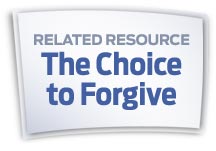BY KAREN GREEN Forgiveness is a topic that has been discussed and debated in Christian circles for many years. When faced with a personal situation that requires forgiveness, however, it becomes a little more difficult and involved than the philosophical and even biblical reasoning that might have been put forth in past discussions and debates. The reality of the situation and the hurt and anger we experience may render it difficult to generously and immediately offer the offender forgiveness. “After all,” we may reason, “they don’t deserve my forgiveness, and they should suffer the same pain—if not worse—that I’m experiencing.”
 Forgiveness, as with most situations faced in life, is a decision or a choice. Many of us struggle with the decision to forgive, and the offenses, real or imagined, are varied. The need to forgive can stem from hurt feelings, dishonesty, gossip, loss of trust, marital infidelity, divorce, abandonment, and death, to name a few.
Forgiveness, as with most situations faced in life, is a decision or a choice. Many of us struggle with the decision to forgive, and the offenses, real or imagined, are varied. The need to forgive can stem from hurt feelings, dishonesty, gossip, loss of trust, marital infidelity, divorce, abandonment, and death, to name a few.
As a counselor, I’ve seen many clients who struggle with the decision to forgive. Many times their inability to forgive renders them incapable of moving ahead with their lives and achieving their goals. Their time and energy are spent rehearsing and rehashing the past injustices of the offender. In most cases it seems as though each time the “story” is retold the person becomes more enraged. The refusal to forgive is usually a cause for anger in many individuals, and uncontrolled anger can lead to many social, physical, and emotional difficulties, such as illness and alienation from friends and family. Deciding not to forgive can also alienate you from God and the peace and fellowship He wants you to enjoy with Him and other believers.
While the decision not to forgive might bring pain to the offender, in some cases it does not. The person may be unaware that they have offended you, or they may have chosen to move on with their life with little or no regard for the hurt and pain they have caused you. Your decision not to forgive in most cases, however, can have some long-lasting and damaging effects on you.
Looking to God’s Word
God’s Word is replete with guidance to help us in our choice to forgive. In many instances He admonishes us to forgive others (Col. 3:13; Eph. 4:32). We also are reminded in these verses of Scripture that we should forgive as Christ has forgiven us. This reminder is helpful when we are tempted to consider an offense to be of too great a magnitude to merit our forgiveness. We often have committed grave sins against God, yet His Word contains many promises of redemption if we confess and ask His forgiveness (see ?1 John 1:9; Eph. 1:7; Ps. 85:2; Isa. 55:7; Mark 3:28; 2 Chron. 7:14). God even goes a step further: He promises that once we confess and He forgives our sins, He will blot out our sins and remember them no more (see Isa. 1:18; 43:25; Ps. 32:1, 2; Micah 7:19). What an awesome and wonderful God!
 Forgive as He Forgives
Forgive as He ForgivesBecause Jesus is our example, we should endeavor to forgive as He forgives. Unlike God, however, our human nature renders us incapable of forgetting major events of the past, no matter how hard we try. If the incident we choose to forgive is one of great magnitude and a life-altering event, it most likely will be impossible to forget it. But how we choose to respond each time we recall the incident will be the indicator as to whether we have truly forgiven the person. The previous anger and resentment should be gone.
Forgiving also does not necessarily mean returning to the same type of relationship we had with the person. It would be best to fully restore the relationship with the person, but in some cases it’s impossible to do so. We should be careful, however, not to harbor anger and resentment toward that person, but should present them to God in prayer.
Benefiting Ourselves
The choice to forgive is not always easy but it can be done—and it will greatly benefit you. Everyone approaches forgiveness in a different way and at a different pace, but the end result will be the same and well worth the decision to forgive. The first step that everyone must reach is to acknowledge that you have been harboring an unforgiving attitude. Go a step further and examine the facts of the situation as well as the effects—social, physical, emotional, and spiritual—that it has had on your life. Sometimes in examining the facts you might come to realize that your reaction was not really warranted or appropriate.
The next and perhaps the biggest step is to make the decision to forgive. How you go about doing this is as varied as each unique situation. An important step to take once you have decided to forgive is to pray and ask God to give you the strength and grace to forgive and to direct your life as you take this great step forward. With His help, the weight and burden will be lifted as you embrace a more peaceful life in Christ.
Forgiveness brings freedom. It releases you from the power and control you had allowed the offending person to have over you. It allows you freedom from the past patterns of bitterness and hurt that permeated your relationships with others. As we let go of grudges it gives us peace of mind and a healthier way of relating to others—and it makes us more understanding of those around us.
God expects His followers to demonstrate a spirit of forgiveness, but, as with everything else, He does not force His will upon us. He gives us freedom of choice.
To forgive or not to forgive—the choice is yours.
________
Karen Green is a counselor, freelance writer, and seminar presenter living in Taylor, Michigan. This article was published August 19, 2010.

 Forgiveness, as with most situations faced in life, is a decision or a choice. Many of us struggle with the decision to forgive, and the offenses, real or imagined, are varied. The need to forgive can stem from hurt feelings, dishonesty, gossip, loss of trust, marital infidelity, divorce, abandonment, and death, to name a few.
Forgiveness, as with most situations faced in life, is a decision or a choice. Many of us struggle with the decision to forgive, and the offenses, real or imagined, are varied. The need to forgive can stem from hurt feelings, dishonesty, gossip, loss of trust, marital infidelity, divorce, abandonment, and death, to name a few. Forgive as He Forgives
Forgive as He Forgives